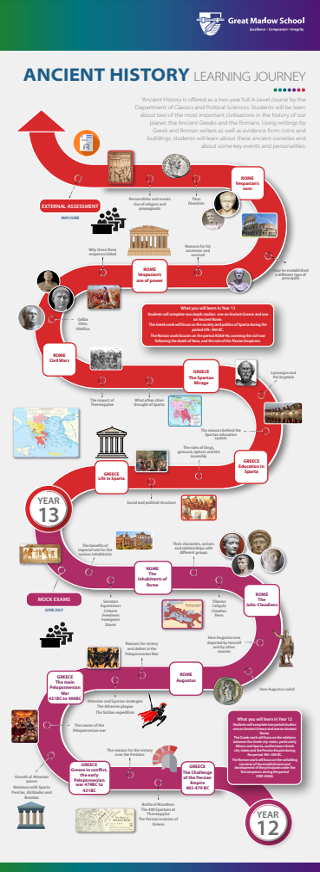
Telephone - 01628 483 752
Company Registration No.07690054
- Welcome
- News & Events
- About Us
- School Life
- Canteen & Catering
- Careers Programme
- Duke of Edinburgh’s Awards
- House System
- Library
- Lockers & Bicycle Racks
- One to One Laptop Scheme
- Parents’ Evenings
- Prefects: Sixth Form & Year 11
- Safeguarding
- School Nurse
- School Transport
- Student Support and SEN
- Teacher Training
- Transition to Year 7
- Uniform, Hair, Jewellery, Phones
- 6th Form
- Curriculum
- Parent & Carers
- Attendance Guide
- Bucks Family Information Service
- Bucks School Transport
- Communication & Catering
- Friends of Great Marlow School
- Information Evenings
- Gift Aid
- Letters Home
- Mental Health Support
- Online Safety Resources
- Parent/Carer Services
- Progress Review Guides
- School Uniform Shops
- Special Educational Needs
- The Voice – School Newsletter
- Student Area
- Sport
- Gallery
Ancient History
 Ancient History is a high status classical qualification that will help to make a job or college application unique. This is a valuable subject to study because many of our political, philosophical and scientific ideas are based upon ancient Greek and Roman learning. Ancient History is ideal for students who did not study history at GCSE because it is a course that investigates a different historical time.
Ancient History is a high status classical qualification that will help to make a job or college application unique. This is a valuable subject to study because many of our political, philosophical and scientific ideas are based upon ancient Greek and Roman learning. Ancient History is ideal for students who did not study history at GCSE because it is a course that investigates a different historical time.
- Ancient History at Great Marlow School
- Learning Ladders
- Key Stage 5 Ancient History
- Careers in Ancient History
ANCIENT HISTORY AT GREAT MARLOW SCHOOL
Ancient History is one of three A-level courses offered by the Department of Classics and Political Sciences. Students study OCR’s full two-year A-level course in Ancient History (H407).
Students do not need to have taken GCSE History to study this subject but must obtain a GCSE Grade 6 or higher in History or English to be eligible for enrolment in this course. GCSE History candidates often choose to study this as an alternative to A-level History and, each year, several take both courses. This is allowed as History is classified as a ‘Humanity’ subject whereas Ancient History is a ‘Classic’.
The course concludes with two exams: one on the Greek component and one on the Roman component.
There is no coursework but students who are also taking A-level History, which does have a coursework component, have the option of choosing an Ancient History topic for their coursework essay in that subject.
In recent years the national average has been exceeded by the students in this school. Students perform particularly well because teachers understand that this course is marked in a very different way to A-level History and teach accordingly. Knowledge of Ancient Greece and Rome is based on the few written accounts that happen to have survived for 2000 years, as well as on archaeological evidence and coins. Students are taught to maintain a tight critical focus on this evidence when answering questions and their success results from concentration on the evidence.
KEY STAGE 5, ANCIENT HISTORY – Years 12 & 13
Paper 1 (Unit H407-11) – Greek History
Greek Period Study: Relations between Greek states and between Greek & non-Greek states, 492-404BC
Overview of Topic
This module investigates how the city-state of Athens formed a league with other city-states as protection against the threat from the Persians. Over time Athens came to dominate this league, turning it into an empire. This brought Athens into conflict with Sparta; we look at the reasons for this conflict, its nature, its progression and its outcome.
The period study requires the critical use of ancient source material in analysing and evaluating historical questions, problems and issues.
Key Issues
- The reasons for the victory over the Persians in 480-479BC.
- The causes of the Peloponnesian War in 431BC.
- The reasons for Athenian failure in the Peloponnesian War.
Greek Depth Study: The Society and Politics of Sparta, 478-404BC
Overview of Topic
The Spartans were very strange. All boys would leave home at the age of seven to go to military school and the Spartans had their own version of the ‘free to murder day’ depicted in the film ‘The Purge’ except their’s lasted for a week and involved killing slaves. The course looks at how the Spartans’ military society functioned, at the education of both boys and girls and at their complete reliance on slaves. Lacking an insider’s view on the Spartans who did not write themselves, we have to bear in mind that most of our knowledge derives from what other Greeks wrote about them.
Paper 2 (Unit H407-22) – Roman History
Roman Period Study: The Julio-Claudian Emperors, 31BC-AD68
Overview of Topic
This module investigates how Rome was transferred from an Republic into an Empire by Augustus during his 45-year rule, and the way he attempted to hide from the Romans how he was transforming their constitution through the pretence that he was a supporter and maintainer of traditional values and practices. The course moves on to the four strange successors of Augustus: Tiberius – he lived a life of debauchery and vice with hundreds of young boys and girls; Caligula – a raving lunatic who thought he had become a God and who made his horse a senator; Claudius – a deformed, stuttering imbecile who married his niece; and Nero – a complete nutcase who had Christians thrown to the lions, smeared in tar and set ablaze as street-lights.
The period study requires the critical use of ancient source material through analysing and evaluating historical questions, problems and issues.
Key Issues
- The extent to which Augustus actually restored the Republic.
- The characters of Tiberius, Caligula, Claudius and Nero.
- The benefits of Imperial rule for the inhabitants of Rome.
Roman Depth Study: The Flavians, AD68-96.
Overview of Topic
The Flavian Emperors were Vespasian and his sons, Titus and Domitian. The depth study looks at how this family re-established the prestige of the position of Emperor following the chaos after the fall of Nero. The family’s use of propaganda and religion is examined: how did the Flavians ensure its dominance and how did it cope with crises such as rebellions in the provinces, plague and the destruction of Pompeii.
How is the course taught?
Teaching is in small groups and is shared by two different teachers (one teaching Ancient Greek and the other teaching Ancient Rome) using a variety of teaching styles and resources. There is no coursework but students who are also taking A-level History (which still has a coursework element) have the opportunity to produce an essay on an Ancient History topic as their History A-level coursework assignment.
Careers in Ancient History |
||
| Archivist | IT Programmer | Project Manager |
| Classics/Classical Studies | Journalist | Stockbroker |
| Diplomat or International Relations | Marketing | Teacher |
| Event Coordinator | Police Investigator | Tour Guide or Planner |
| Historian Museum Curator | Politician | Translator or Interpreter |
| Human Resources | Probation or Social Worker |
